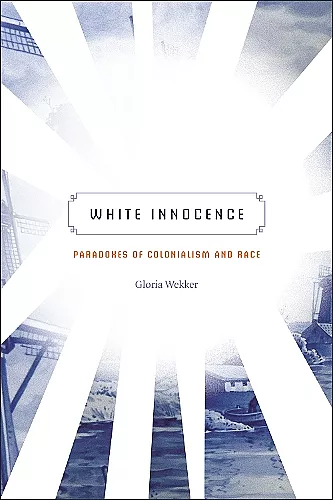White Innocence
Paradoxes of Colonialism and Race
Format:Paperback
Publisher:Duke University Press
Published:29th Apr '16
Should be back in stock very soon

This insightful examination of Dutch society highlights the complexities of racial denial and colonial history. White Innocence challenges prevailing narratives of racial exceptionalism.
In White Innocence, Gloria Wekker delves into a significant paradox within Dutch society: the simultaneous denial of racial discrimination and colonial violence, which exists alongside overt racism and xenophobia. This exploration reveals how the narrative of Dutch racial exceptionalism conveniently overlooks the Netherlands' colonial history, thus preserving white privilege. Wekker's analysis is grounded in a cultural archive that spans over 400 years of colonial rule, providing a critical lens through which to view contemporary Dutch identity and its complexities.
Wekker challenges the prevailing perception of the Netherlands as a 'gentle' and 'ethical' nation by scrutinizing various aspects of Dutch culture. She examines the portrayal of black individuals in Dutch media, the shortcomings of the academic discourse on race, and the troubling dynamics of modern conservative politics. Notably, she highlights the paradox of gay politicians who promote anti-immigrant sentiments, revealing the contradictions within the societal framework. Furthermore, the controversy surrounding the folkloric character Black Pete serves as a focal point for understanding the denial of racism in Dutch culture.
Through her work in White Innocence, Wekker uncovers the enduring postcolonial legacy of race and its profound influence on the self-perception of white Dutch citizens. By bringing to light the persistent and contested nature of racism in the Netherlands, she invites readers to confront uncomfortable truths about their national identity and the implications of historical narratives that prioritize innocence over accountability.
"White Innocence explains why white Dutch people seem unable to grasp the racism of Zwarte Piet: Assured of their own social progressivism, they can a priori think and therefore do no wrong. . . . Wekker concludes her work with a plea for 'another "embarrassment of riches,"' for acknowledging the racism staring us in the face. In the United States, we might start by recognizing that there is, and always has been, no more audacious identity politics than white identity politics, as Trump and his white-supremacist ilk gleefully demonstrate. At least the illusion of innocence has been stripped away. Or perhaps not?"
-- Nick Barr Clingan * The Nation *
"White Innocence exposes how Dutch racism is infused with classism, sexism, and homophobia in discussions of everyday racism that includes [Wekker's] own personal exoticization as a child and criminalization as an adult, TV talk shows and films, experiences of mixed-race families, white gay liberation that constitutes Dutch homonationalism . . . and the 'siloing' of gender and race/ethnicity in politics and academics that makes intersectional policy and scholarship impossible. In doing so, Wekker reveals the very real personal consequences for people of color when their very existence is in service of white people." -- Melissa F. Weiner * Journal of Anthropological Research *
"White Innocence provides a welcome and thought-provoking impetus to think more acutely about the long-term impacts of imperialism, as well as about the interrelations between colonies and metropole." -- Bart Luttikhuis * History: Reviews of New Books *
"White Innocence makes a significant contribution to the field of critical whiteness studies by examining the role of race, especially whiteness, and the legacy of colonialism in the present-day Netherlands." -- Shannon Sullivan * philoSOPHIA *
"White Innocence is an enticing invitation to confront the contradictions of Dutch discourse on race, colonialism and violence. . . . Wekker’s work is of vital relevance for those willing to unlearn the legacy of
colonialism." -- Lucía Berro Pizzarossa * European Journal of Women's Studies *
"This book has been a long time coming. . . . An exemplary work of critical scholarship." -- Paul Mepschen * Journal of the Royal Anthropological Institute *
ISBN: 9780822360759
Dimensions: unknown
Weight: 340g
240 pages